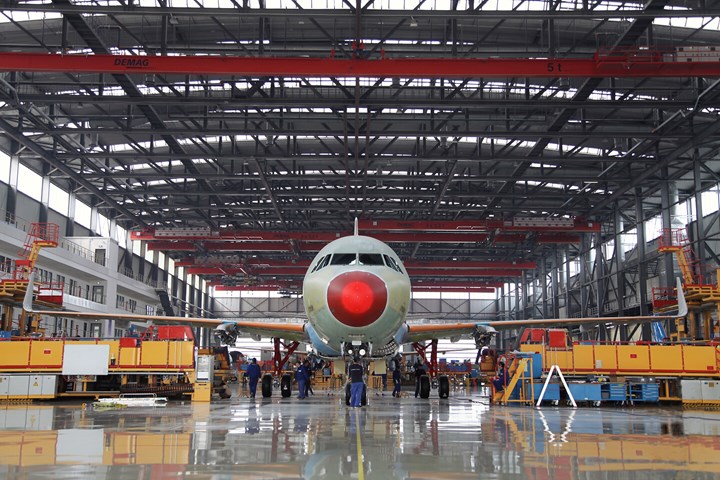Airbus to expand A320 assembly capacity in China
A recent industry agreement to open a second line in Tianjin, China is targeted at Airbus’ goal to produce 75 aircraft/month globally in 2026.

Aiming for a global production rate of 75 aircraft per month in 2026, Airbus (Toulouse, France) recently signed new cooperation agreements with Chinese aviation partners during a French state visit to China.
Airbus CEO Guillaume Faury signed an agreement with the Tianjin Free Trade Zone Investment Co. Ltd., and Aviation Industry Corp. of China Ltd., to expand A320 Family final assembly capacity with a second line at its Tianjin site. The agreement was witnessed by Chinese President Xi Jinping and French President Emmanuel Macron.
Currently, Airbus has four A320 Family final assembly sites worldwide: Hamburg (Germany), Toulouse (France), Mobile (U.S.) and Tianjin (China). The Tianjin Final Assembly Line (FAL Asia) started operation in 2008 and has assembled more than 600 A320 Family aircraft to date. In March 2023, the first A321neo aircraft was delivered from the line.
In addition, Airbus also signed General Terms of Agreement (GTA) with the China Aviation Supplies Holding Company (CAS) covering the purchase of 160 Airbus commercial aircraft. The GTA comprises earlier announcements for 150 A320 Family aircraft and for 10 A350-900 widebody aircraft orders, reflecting the strong demand in all market segments by Chinese carriers.
According to Airbus, over the next 20 years, China’s air traffic is forecasted to grow at 5.3% annually, significantly faster than the world average of 3.6%. This will lead to a demand for 8,420 passenger and freighter aircraft between now and 2041, representing more than 20% of the world's total demand for around 39,500 new aircraft in the next 20 years.
In line with its sustainability strategy, Airbus and the China National Aviation Fuel Group (CNAF) also signed a Memorandum of Understanding (MoU) to intensify Chinese-European cooperation on the production, competitive application and common standards formulation for Sustainable Aviation Fuels (SAF). Earlier in September 2022, Airbus and CNAF contracted to support commercial and delivery flights in China to be operated with SAF. By the end of March, 17 delivery flights and a first commercial flight were facilitated by the two partners. This new cooperation agreement aims at optimizing the SAF supply chain by diversifying the sources and enhancing SAF production towards the ambition of using 10% SAF by 2030.
Related Content
-
Plant tour: Middle River Aerostructure Systems, Baltimore, Md., U.S.
The historic Martin Aircraft factory is advancing digitized automation for more sustainable production of composite aerostructures.
-
Combining multifunctional thermoplastic composites, additive manufacturing for next-gen airframe structures
The DOMMINIO project combines AFP with 3D printed gyroid cores, embedded SHM sensors and smart materials for induction-driven disassembly of parts at end of life.
-
ASCEND program update: Designing next-gen, high-rate auto and aerospace composites
GKN Aerospace, McLaren Automotive and U.K.-based partners share goals and progress aiming at high-rate, Industry 4.0-enabled, sustainable materials and processes.

.jpg;width=70;height=70;mode=crop)












.jpg;maxWidth=300;quality=90)

